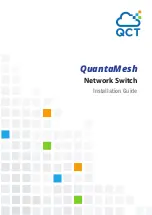
Signaling — External Links
359
A point-to-multipoint call has the following properties:
The source end point serves as the root in a simple tree topology.
When this link node sends information, all of the remaining nodes on
the call receive copies of the information.
Data flows only from the root to the destination nodes.
There is no data flow between the destination nodes.
Displaying
Connections
For information about displaying port connections, see “Display Port
Connections” on page 162.
Signaling Sequences
Point-to-Point Connection
The sequence of signaling messages for setting up a point-to-point
external link (connection) by signaling is shown in Figure 18.
From the Calling Party to the ATM Enterprise Switch:
The calling
edge device initiates the establishment of a connection by sending a
SETUP message that contains the connection characteristics except for
VPI/VCI. If the switch can provide the requested service and finds the
route to the destination, it allocates a value of VPI/VCI, optionally
answers with CALL PROCEEDING and passes the call through to the
destination end station. If the call is accepted by the receiving side, the
switch informs the sender by sending a CONNECT message. The
sender may then acknowledge this by CONNECT ACKNOWLEDGE.
This completes the connection setup sequence and the call is now in
ACTIVE state, that is, data cells may be transferred from source to
destination.
From the ATM Enterprise Switch to the Called Party:
The switch
sends a SETUP request to the receiving edge device after having
allocated resources for the call (VPI/VCI, QOS, traffic parameters). The
receiving edge device carries out a compatibility check by comparing
the address information, QOS parameters, and traffic parameters in
the SETUP message. If the check passes and the connection
specifications are accepted, the receiving edge device replies with a
CALL PROCEEDING or CONNECT. The switch then acknowledges the
CONNECT by CONNECT ACK and the connection then transfers into
ACTIVE state.
The release procedures are similar to the establishment procedures.
Summary of Contents for CoreBuilder 9000
Page 18: ......
Page 36: ...36 CHAPTER 1 OVERVIEW...
Page 44: ......
Page 152: ...152 CHAPTER 6 MANAGING NETWORK INTERFACES...
Page 224: ...224 CHAPTER 8 VIEWING STATISTICS...
Page 306: ......
Page 320: ...320 CHAPTER 10 ATM NETWORK BASICS...
Page 332: ...332 CHAPTER 11 NETWORK INTERFACE MANAGEMENT...
Page 348: ...348 CHAPTER 12 E IISP PROTOCOL...
Page 374: ...374 CHAPTER 14 ATM SWITCHING...
Page 410: ...410 CHAPTER 16 TRAFFIC MANAGEMENT...
Page 426: ......
Page 450: ...450 APPENDIX D TECHNICAL SUPPORT...
Page 454: ...454 GLOSSARY...
















































